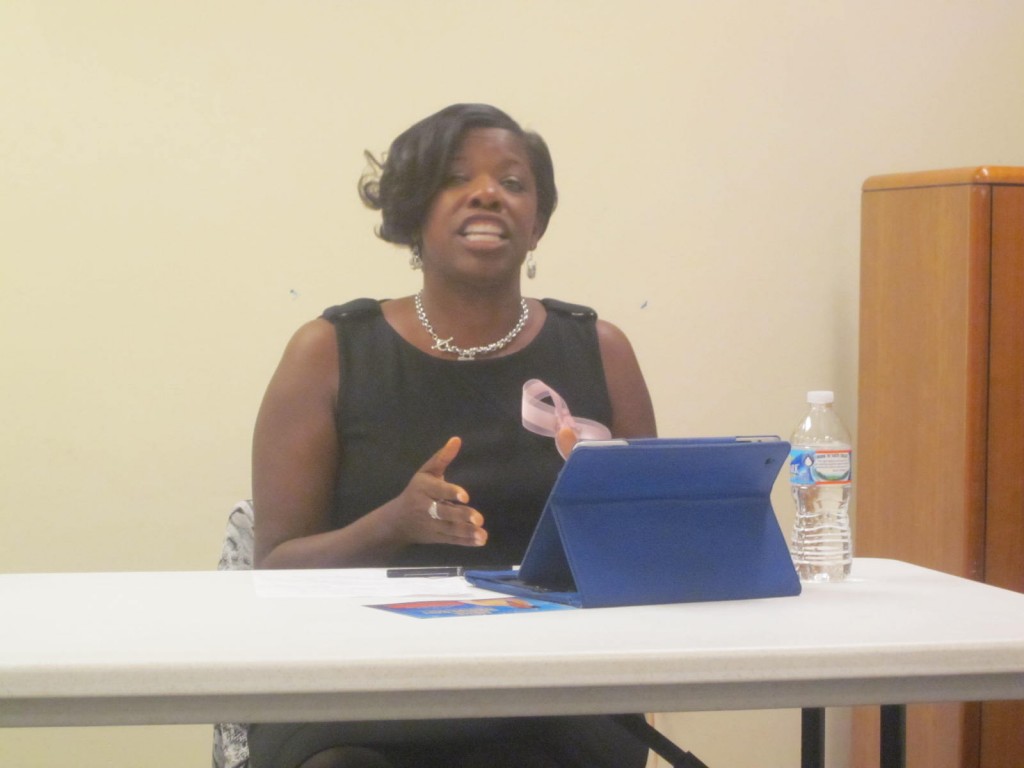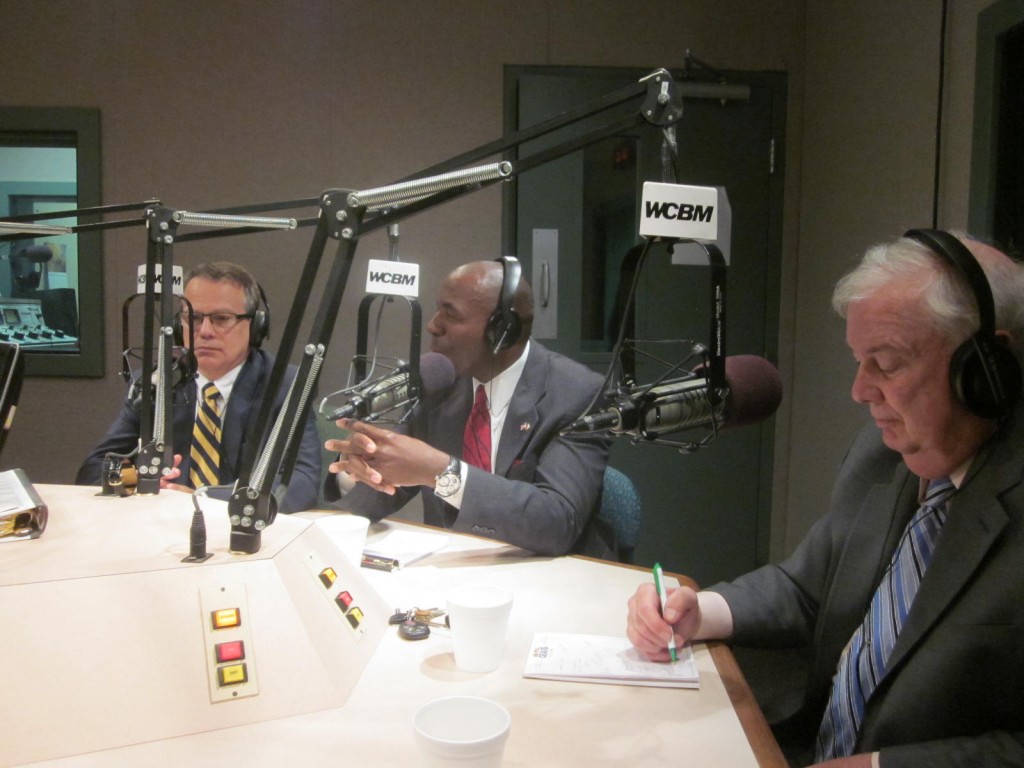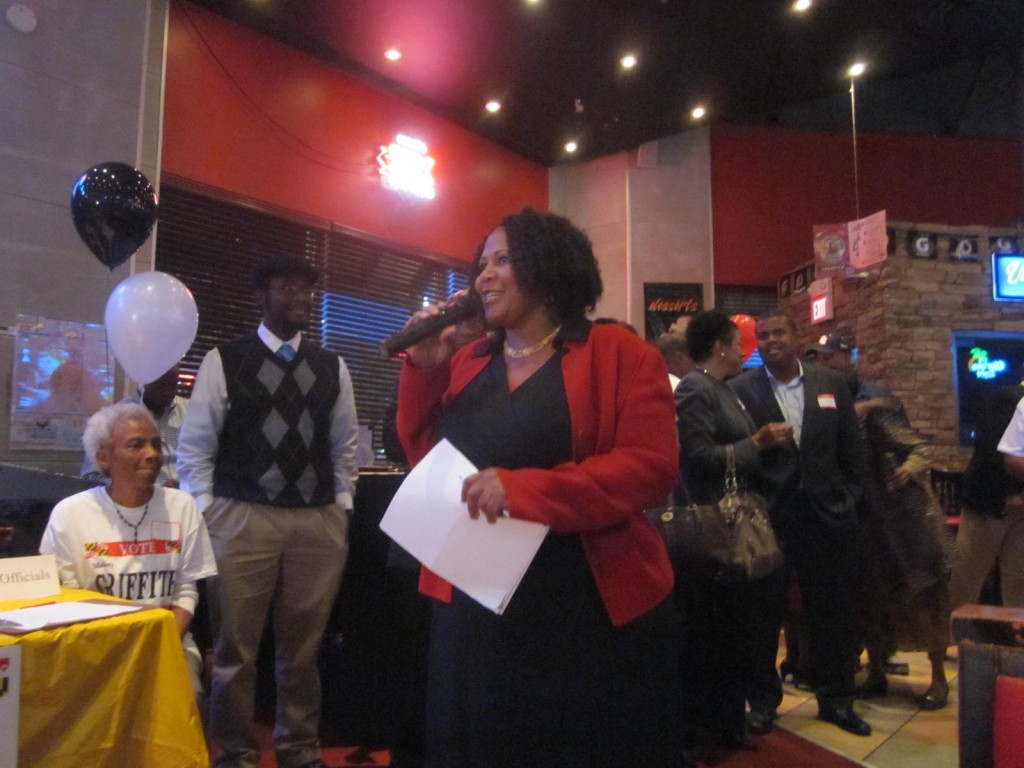Off to the Races: Labor endorsements; AG forum minus Frosh; GOP gov hopefuls on radio; Mandel honored; Griffith vs. Currie
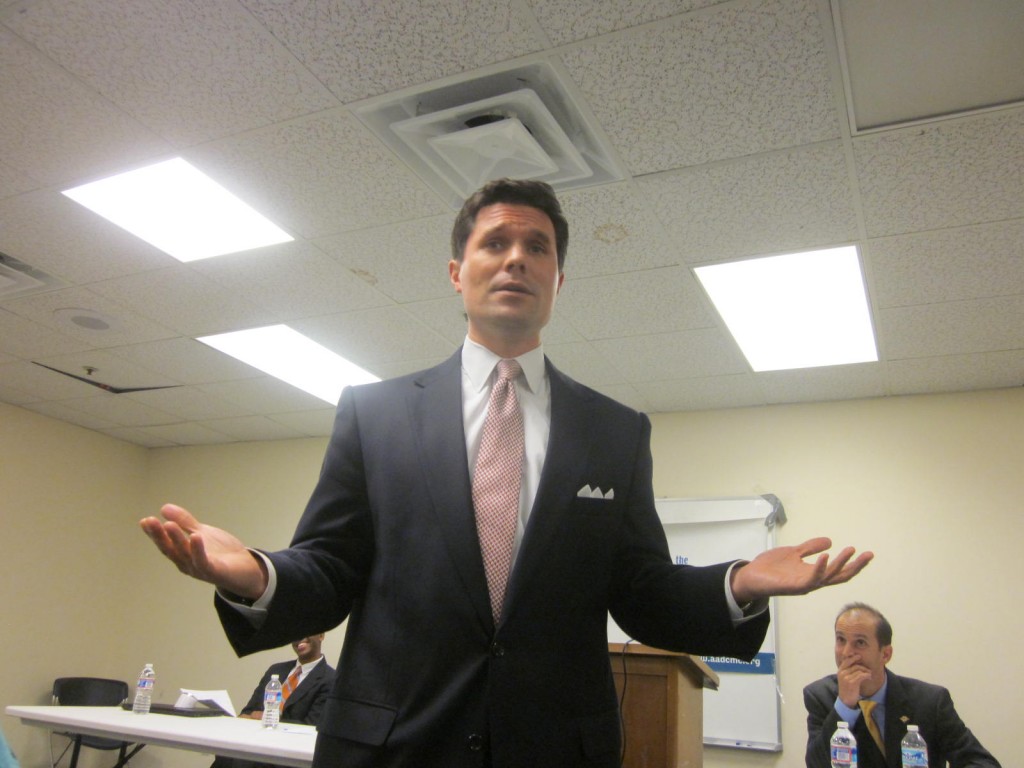
At a forum for attorney general candidates, Del. Bill Frick introduced himself as Del. Jon Cardin, right, listened.
Could the campaign for governor by Attorney General Doug Gansler get any worse this week?
The icing on the pounding he’s been getting for the past two weeks may be losing the endorsement of the AFL-CIO unions to Lt. Gov. Anthony Brown in a vote on Friday. That’s the recommendation at least of the Metropolitan Baltimore Council, according to President Ernie Grecco.
“The governor’s race is Brown’s to lose,” said Grecco.
The unions who represent more than 150,000 workers statewide may not be as politically potent as they once were, but their endorsement can mean a lot in a Democratic primary.
At every level of the endorsement process it takes a two-thirds vote of union representatives to win an endorsement, and “that’s not an easy thing to do,” Grecco said.
In the past, the unions haven’t endorsed till after the filing deadline, but the move of the primary to June 24 next year has caused real headaches by accelerating the process.
In the race to succeed Gansler as attorney general, Grecco and his council back Montgomery County Sen. Brian Frosh, chairman of the Judicial Proceeding Committee, but that’s a harder choice with Dels. Aisha Braveboy, Jon Cardin and Bill Frick in the race. “All four are good labor votes,” said Grecco.
The union will also be endorsing some candidates for the General Assembly. While all six state councils must vote, Grecco’s Baltimore Council has recommended endorsing: Sen. Nathaniel McFadden, the Senate president pro-tem facing a primary challenge from former campaign consultant Julius Henson; Sen. Verna Jones-Rodwell, who has a primary challenge from Del. Shirley Nathan-Pulliam; Dels. Cheryl Glenn, Adrienne Jones and Maggie McIntosh; and Senate President Mike Miller. It is also recommending three non-incumbents: Dundalk Del. John Olszewski running for the seat of retiring Sen. Norman Stone, one of labor’s most reliable allies; Democrat Del. Mary-Dulany James, running in Harford-Cecil for the seat of retiring Republican Sen. Nancy Jacobs; and Cory McCray, a newcomer from District 45 in northeast Baltimore City.
Attorney general forum minus one
All four Democratic AG candidates had been advertised to attend last Tuesday night’s forum at the Wheaton library sponsored by the African American Democratic Club of Montgomery County. But Frosh had a scheduling conflict, so it was just the three delegates, who sounded like a friendly subcommittee meeting in the House of Delegates.
It was their first encounter since last week’s Gonzales Poll found that Del. Jon Cardin had a clear lead with 25% support, versus 13% for Frosh, 8% for Braveboy, and 5% for Frick. Still, almost half are undecided.
Frick, a second term delegate from the same Bethesda District 16 as Frosh, got off some of the more interesting lines of 90-minute forum. Alluding to the poll, Frick said he was sorry to be running so far behind the leader in the race — “undecided.”
Discussing the problem of Internet privacy, Frick mentioned a blogger posting when he got appointed to his seat in 2007. It’s still floating around the Internet.
“I’m not thrilled with ‘Who the frick is Bill?’ but it would be a lot worse if there were naked pictures of me on the Internet,” said Frick
The four candidates are scheduled to meet Nov. 7 at the University of Maryland Law School in Baltimore. So far, there are no Republicans in the race, but the party is trying to recruit a candidate.
Three Republicans vie for governor on WCBM
The three GOP candidates for governor were on WCBM Thursday morning for two hours with host Pat McDonough, the Middle River delegate. This time the only empty seat was for the Sun reporter McDonough said he had invited. MarylandReporter.com’s Len Lazarick got to ask questions of Harford County Executive David Craig, Anne Arundel County Del. Ron George and Charles County businessman Charles Lollar.
The Republicans are not at the stage where they’re attacking each other, and they agree on many issues, including repealing the “rain tax” and many of the other tax hikes of the last six years. They all oppose increasing the minimum wage.
“The key issues are taxes and the economy,” said Craig. “We agree on just about everything… We don’t want to split the party.”
Lollar, a favorite for some in the Tea Party, said he wanted to make sure “that this [race] does not become a blood bath.” (They’re all hoping the fighting in the Democratic race continues for months.)
After all the friendly agreement, the three were asked to describe what their differences were.
“I’m the one that has actually governed,” said Craig. “We need someone who actually knows how to balance a budget.”
George, who runs a jewelry business in Annapolis and Arnold, emphasized his 40 years in the private sector and getting things done in the Assembly.
Lollar pointed to his 17 years as an executive with a Fortune 500 company (Cintas) and his 16 years “leading men into combat,” as a Marine officer, “some of the most stubborn men you’ll ever meet in your life.”
All said they could work with Democrats who dominate the state and the General Assembly to get things accomplished.
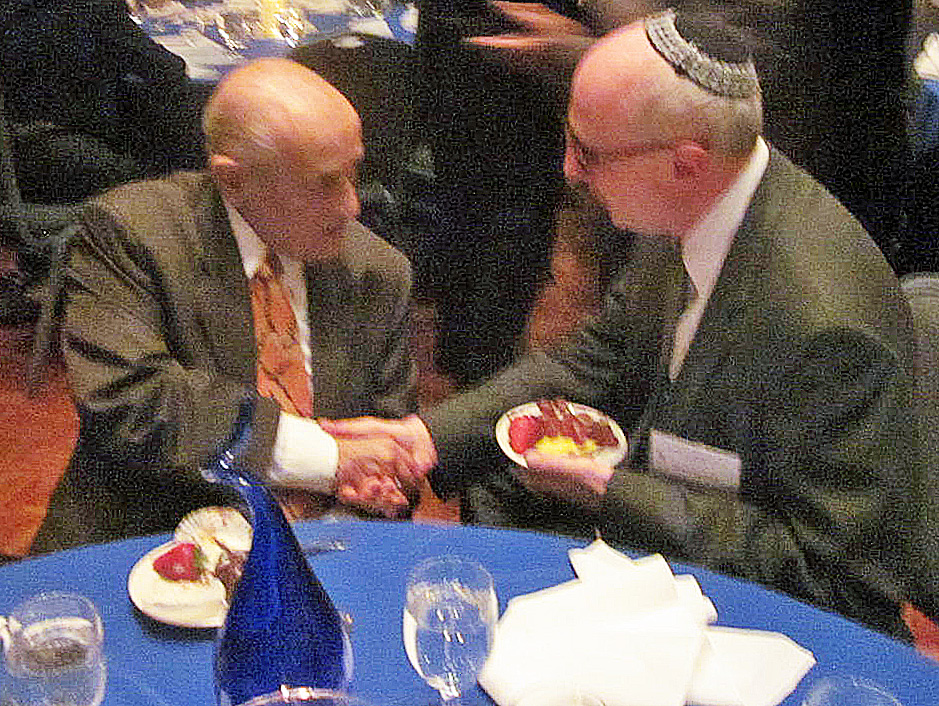
Former Gov. Marvin Mandel, left, is congratulated by Rabbi Stuart Weinblatt of Congregation B’Nai Tzedek in Potomac.
Mandel honored by Jewish law society
Former Gov. Marvin Mandel, now 93, who served from 1969 to 1979, was honored Thursday night by the Simon Sobeloff Law Society, named after the first Jew appointed to the Maryland Court of Appeals. the state’s highest court, and the first to serve as its chief judge, as well as solicitor general of the United States.
Mandel was the first and only Jew to serve as Maryland’s governor, and is credited with major reforms of Maryland’s judicial system. He established the District Court system and the judicial nominating system that, to this day, reviews the qualifications of judicial candidates.
The dinner at the Ten Oaks Ballroom in Clarksville drew many judges and lawyers from around Maryland, including Mary Ellen Barbera, the first woman to be chief judge of the Maryland Court of Appeals.
Mandel’s achievements were praised by a series of speakers. Former Del. Tim Maloney, a Prince George’s County attorney who is a behind-the-scenes power player in judicial nominations to the appellate courts, told some funny stories about Mandel before he got serious. At the time of his election, the governor was also the head of the vestry of the Episcopal Church in Maryland, the first Jew to head that body.
Quoting the modest epitaph for English architect Christopher Wren in St. Paul’s Cathedral in London, “if you seek his monument, look around you,” Maloney said Mandel’s monument was Maryland’s modern state government, which he consolidated.
U.S. House Minority Whip Steny Hoyer became president of the Maryland Senate during Mandel’s tenure, and said the governor supported him despite the fact that Hoyer voted for someone else for governor. Hoyer recalls Mandel’s comment at the time: “You cannot go through life with a rear view mirror.”
Mandel, the Speaker of the House of Delegates when he was elected, was known as a legislative craftsman who got things done in sharp contrast to the “totally dysfunctional body in which I serve,” said Hoyer, referring to Congress.
U.S. District Court Judge Alexander Williams recalled how Mandel had appointed some of the first African American judges and other officials around the state, “bold moves in the 1960s and ‘70s.”
Accepting the award, Mandel discarded the five-page speech he said he had prepared and acknowledged the accolades. “I don’t know whether I earned them, but I appreciated them.”
He remembered his service as governor as a time when “we could disagree agreeably.”
“We all had one thing in mind — to make this government work.”
Griffith challenges Currie
In contrast to Del. Guy Guzzone’s fundraiser for his Senate race Wednesday headlined by Senate President Mike Miller and attended by other delegates and state senators, Del. Melony Griffith is getting little love as she challenges Sen. Ulysses Currie in Prince George’s County District 25.
Currie was found not guilty of corruption in a federal trial in 2011; one of his defenses was that he was too dumb to pull off a complicated bribery scheme. But Currie is still a good friend of Miller, who is supporting his reelection.
Griffith’s kick-off event at a wing’s grill in Largo last week was low key but high energy. It was attended by few public officials but by a lot of the African American women in the 45-60 age bracket that make up 60% or more of the Democratic primary voters in that district.
Mayor James Wells of the small town of District Heights, one of the few electeds to show their face, told the crowd of about 100 that “it means a lot to have a smart individual representing us in Annapolis.”
“Nobody knows more about pensions in the state of Maryland than Melony Griffith,” Wells said.
Griffith has served four terms in the House and co-chaired the Joint Committee on Pensions.
“There’s power in being one of 47 senators,” said Griffith, rather than one of 141 delegates. “From the Maryland Senate, I will be able to partner with you at a different level.”
“This is not going to be an easy race,” she said.

MarylandReporter.com is a daily news website produced by journalists committed to making state government as open, transparent, accountable and responsive as possible – in deed, not just in promise. We believe the people who pay for this government are entitled to have their money spent in an efficient and effective way, and that they are entitled to keep as much of their hard-earned dollars as they possibly can.

